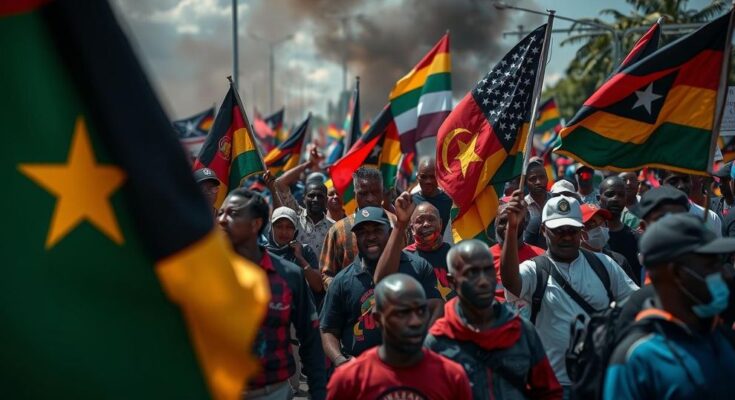Mozambique is experiencing significant unrest following the controversial elections, where the ruling Frelimo party extended its long-standing rule amidst allegations of fraud. Violent protests have erupted, leading to a police crackdown with reported fatalities. Key opposition figure Venancio Mondlane has called for strikes while fearing for his safety after assassinations of his allies. The situation has escalated tensions within the region, prompting neighboring countries to take precautions.
Mozambique is currently enduring significant civil unrest following the elections held on October 9, 2024. The ruling Front for the Liberation of Mozambique (Frelimo) party, which has dominated the political landscape for 49 years, claimed victory in the presidential race, leading to widespread allegations of fraud and manipulation from opposition groups and dissatisfied citizens. Since the announcement of the results on October 24, protests have erupted, primarily in the capital, Maputo, with demonstrators clashing violently with police forces, resulting in multiple fatalities and numerous injuries. The unrest escalated as police employed tear gas and rubber bullets against protesters, leading to a violent crackdown characterized by harsh measures. Human rights organizations have reported that the death toll stands at a minimum of 20 casualties due to police actions, with local claims suggesting the number exceeds 50. In rapid response to the civil disorder, the Mozambican authorities have threatened to mobilize military forces. With demonstrators setting fires in the streets and attacking party offices, the situation remains dire as the government limits internet access and impedes social media platforms to curtail mobilization efforts. Amid this uproar, prominent opposition figure Venancio Mondlane has emerged as a vocal critic of the elections, asserting that the integrity of the process has been compromised. After calling for a national strike, he faced a grim turn of events upon the assassination of key opposition members in a late-night shooting incident. Following these events, Mondlane expressed fear for his safety and has fled Mozambique, yet he continues to rally for further protests via social media, urging citizens to resist from what he describes as decades of oppression. Mozambique’s history of civil strife, stemming from a protracted civil war, has established a backdrop of skepticism regarding political stability and governance. The societal scars of past violence coupled with the current economic challenges and the threat of insurgency in the northern regions further complicate the situation. The discontent among the youth, particularly towards established political norms, has fueled support for Mondlane and the emerging Podesa party as the leading alternative to Frelimo’s longstanding dominance. As Mozambique navigates through these turbulent times, the ability of the government to restore order while addressing the grievances of its populace remains under scrutiny. The international community watches closely, with neighboring countries like South Africa responding by tightening their borders amid fears of escalating violence spilling beyond national lines.
The political landscape of Mozambique has been dominated by the Frelimo party since the country gained independence from Portugal in 1975. The latest elections, held in October 2024, have exposed deep-rooted issues of electoral integrity and civil rights, as opposition parties claim the elections were marred by fraud, including ballot stuffing and manipulation. This recent unrest follows years of discourse surrounding political legitimacy in Mozambique, further intensified by the country’s historical struggles and current social challenges, including those posed by extremist violence in specific regions.
The violent protests following the controversial election in Mozambique reveal widespread discontent among the populace regarding the ruling Frelimo party’s prolonged control. The violent suppression of dissent and the tragic loss of life have intensified calls for accountability and reform. As Mozambique grapples with these challenges, the prospects for a peaceful resolution remain uncertain, necessitating careful attention from both national and international observers.
Original Source: apnews.com




